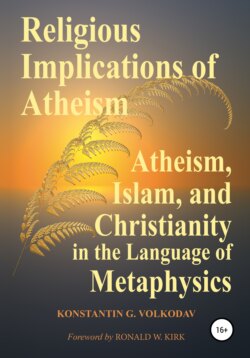Читать книгу Religious Implications of Atheism - Konstantin Gennadievich Volkodav - Страница 7
Debates and Comments
The Same “Dimension” of Atheism and Religion
ОглавлениеThis is perhaps the first religious aspect of atheism to pay attention too. In physics, the concept of dimension plays an important role. One can somehow compare and contrast values of only one dimension. It is impossible, for example, to compare mass and temperature, something triangular and something bright. The same is in the field of human thought and creativity. Nobody will have a debate on the topic: “Mathematics or Music—Which Makes More Sense?” “Chess or Swimming—Which Makes More Sense?” There has never been a debate on the topic: “Atheism or Architecture—Which Makes More Sense?” or something similar. However, the debate on the topic: “Atheism vs Religion” happen very often. Moreover, they happen in the same way as the debates between different religions.
Attempts are sometimes made to bring atheism to a “common denominator” with religions, considering it as a worldview. However, the worldview is an attribute of religion. Therefore, Krauss avoids the term, preferring to emphasize a “common sense”. Nevertheless, no matter how one characterizes atheism; common sense and whatever else and all the same can be found in any religion. Thus, the very fact of the debate between religions and atheism speaks of their equal conditional “dimension”—this is one area of the human spirit.
Moderator: Once I asked a bishop, “What is the purpose of life?” And he said to me, “Go and do a theology degree.” I am not telling you to do theology degree, I am asking you to sit here in the debate for two hours with my two honorable guests over here.
Comment 4
Of course, the bishop should not have rejected the person who asked difficult questions in such a way and put on him a burden that he could not bear. However, in theory, the bishop is right. In short, they may be misunderstood. Moreover, even a two-hour lecture will not help much. Jesus Christ taught the apostles for over three years, but they still did not understand much. Theological education takes much more time than, for example, studying physics or mathematics. In the nineteenth century in Russia, education at the Theological Seminary and Academy took twelve years. The same length of study now with Buddhists. I have been studying Christianity for over twenty five years, got my doctorate degree, but I see before me a whole ocean of unexplored. In general, despite two thousand years of hard work of theological thought, a long series of important questions remain unanswered.
Thus, any debate is not able to reveal the topic completely. This is just an entertaining show for those who do not want to read books. Nevertheless, we use them to provide a clear example of the points of view of the parties to the dispute.
[00:03:12–00:03:50] Moderator: But what, of course, we can do to inform our decisions about this debate tonight to use our reasoning, to use our mind, to use our intellect. And really to have an open mind set. Muslim, Non-Muslim, Christian, whatever you are, whatever you believe in, we should have an open mind set and really go at this with sincerity. I am just asking you, I am asking myself first . . .
[00:03:55–00:05:17] Moderator: This evening two major belief systems, if you like, claim to the truth and going head to head. No matter which side of a fence you tend to reside on. But at the end of the night you will be better informed about Atheism and about Islam . . . And after that there will be “crossfire”. Only without weapons! No heavy arms to be use in this section, both of you. Okay? Good? Although, I understand that tongue is a lot more dangerous than nuclear weapons . . .
[00:07:18–00:07:47] Tzortzis: Today’s question: “Islam or Atheism—Which Makes More Sense?” I would argue that if we use our reason, our rational faculties, we will definitely come to the conclusion, that Islam makes more sense. I will use two simple arguments to verify that claim. Argument number one: Islam makes sense of the origin of the universe. Argument number two: Islam makes sense of the nature of the Qur’anic discourse . . .
Comment 5
Tzortzis sets the direction of the whole discussion: “If we use our reason, our rational faculties . . .” Except for a very brief mention of morality, all issues were discussed from a purely rational point of view. This inevitably led to immersion in the field of physics and mathematics, which Tzortzis did not study deeply. Talking to a cosmologist about cosmology without knowing enough science is counterproductive. It is like a student arguing with an academician. Therefore, it is not surprising that Tzortzis looked like a rather weak opponent compared to Krauss, and his arguments were unconvincing even for many Muslims. He should have talked about the “universe” inside a human, about those many amazing qualities that only a human has. Unfortunately, he did not do this, and we do not consider it appropriate to comment on his arguments in detail and will limit ourselves to just a few brief comments.
However, the weakness of Tzortzis’s argumentation does not yet mean the triumph of Krauss’s ideas. Not at all! If believing scientists, who are also among Krauss’s colleagues, were invited to the debate, they would easily expose him wrong.
Comment 6
